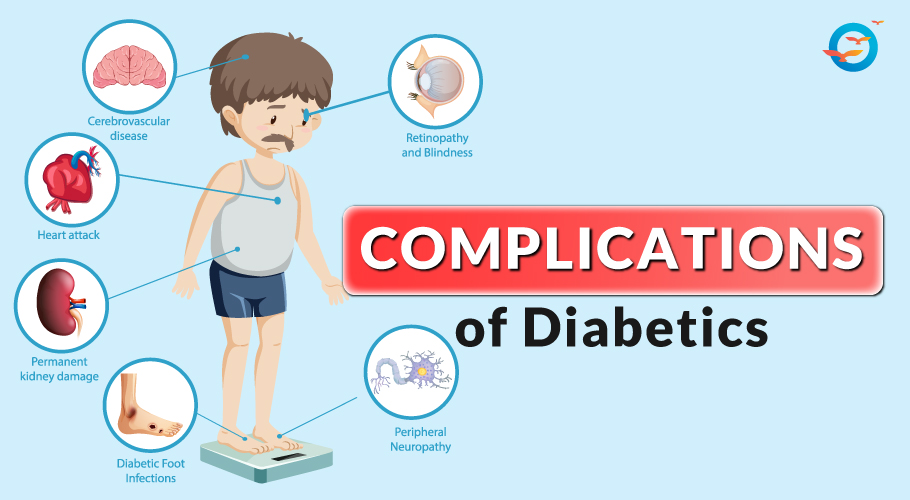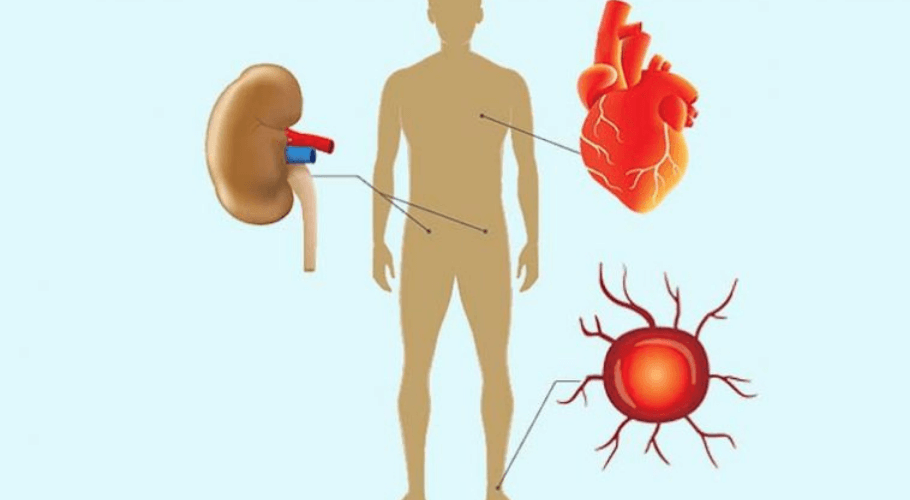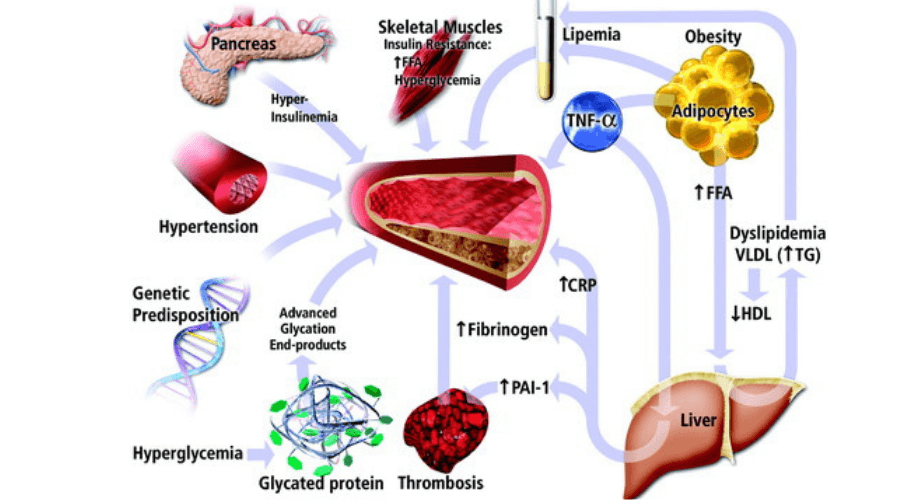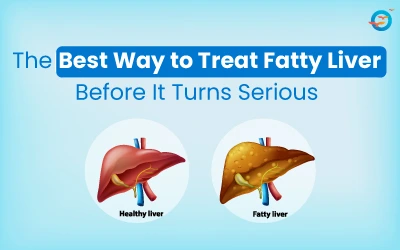Long term Complications of Diabetes Mellitus

Long Term Complications of Diabetes Mellitus
Consistently high or low blood sugar, as we all know is an indicator of diabetes. And this high blood sugar if left unchecked will inevitably result in a number of long-term medical conditions that can seriously compromise health.
The good news is that with some judicious lifestyle changes, diabetics can not only control their blood sugar but even reverse their type-2 diabetes. Type-1 is harder to reverse—this depends on certain medical factors—but controlling their blood sugar can cut risks of complications drastically.
Dietary changes, such as meals that cut out high-glycemic carbs, fat, and add healthy plant-based foods like leafy greens, legumes, pulses, nuts, seeds, and certain fruits should be complemented with exercise that includes cardiovascular exercise, muscle building, and flexibility movements.
Failure to control blood sugar will damage the body’s blood vessels, and this damage leads to complications of diabetes. These problems do not happen overnight, but their very insidious nature makes them all the more dangerous.
What are the two complications of diabetes?
There are two major complications of diabetes that diabetics face
- Microvascular Complications
- Macrovascular complications
High blood glucose causes damage to both small and large blood vessels. Microvascular damage happens when small blood vessels are damaged, and macrovascular complications of diabetes came from damage to large blood vessels.
a. Microvascular Complications of Diabetes

The main organs to be affected in Microvascular Complications of Diabetes are the eyes, kidneys, and nerves. As the small blood vessels get damaged by consistently high blood glucose, they are unable to deliver blood with the required efficiency and this brings complications of diabetes.
1. Kidney Damage:
Your kidneys have many clusters, known as glomeruli, which comprise millions of tiny blood vessels. These blood vessels filter waste from your blood. With time, long-term uncontrolled high blood sugar damages this delicate filtering system.
This can lead to kidney damage or irreversible end-stage kidney disease, requiring regular dialysis or even a kidney transplant.
To avoid kidney damage risk, it is vital that diabetics have their urine checked regularly for protein content (micro-albumin), as this is a sign of kidney damage. Along with urine tests, diabetes should also monitor their blood pressure levels as high BP is a major contributor to kidney disease.
Symptoms of kidney complications of diabetes to watch out
- Edema (retention of water) and edema-related weight gain
- Drowsiness, Itchiness
- Swollen face
- Hands or feet.
If identified in its early kidney damage stages, kidney disease can be completely reversed.
2. kidney complications of diabetes
Permanently high blood sugar can damage the tiny blood vessels of the retina, causing a condition known as diabetic retinopathy. It also increases the risks of other vision-related problems such as Eye Cataract and glaucoma, and can ultimately lead to blindness.
However, with proper blood sugar control, this can be avoided. Diabetes patients should also monitor for symptoms like eye discomfort, watery eyes, blurred vision, loss of vision. With proper diabetic retinopathy treatment, early-stage non-proliferative diabetic retinopathy—as this is known—can be reversed.
3. Nerves:
Unchecked high-blood sugar injures walls of the many tiny blood vessels, called capillaries, whose job is to nurture the nerves leading to your limbs. Damage to these capillaries can be experienced as tingling, numbness, burning, or pain usually beginning at the tips of toes and/or fingers slowly spreading up the limbs.
This is a dangerous symptom, which if left untreated, could result in complete loss of all feeling in the limbs. This slows down the healing of cuts and sores, in fact, in many cases, patients do not even notice the sore, which can deteriorate rapidly and even require amputation of the damaged toe, leg, or finger/s.
Similarly, damage to the nerves related to the digestive tract can cause nausea, vomiting, or diarrhea/constipation. In men, it can damage the tiny blood vessels that nourish the sex organ, leading to erectile dysfunction.
4. Oral Complications of Diabetes Mellitus
High blood sugar is a prime condition for bacterial growth. This breed and damage the tiny blood vessels that keep the teeth and gums healthy and strong. If diabetes is not treated in time and these symptoms are ignored, there is a high risk of gum infection and tooth decay.
As a matter of fact, improper, inconsistent, and insufficient dental care can also cause blood sugar to rise through inflammation. So, everyone, diabetic or not, should ensure they brush and floss after meals, keep their dentures clean—if they use dentures—and visit their dentist regularly.
b. Macrovascular Complications of Diabetes

The Heart, Brain, and Blood Vessels
It’s not just the small blood vessels that are susceptible to damage from high blood sugar. It can also damage the large blood vessels leading to plaque build-up and causing heart attacks or strokes through damage to the heart, brain, legs (though vessel blockage).
Diabetics can easily prevent heart disease and stroke caused by complications of diabetes type 2, by making healthy lifestyle choices.
For instance:
- Avoid tobacco consumption switch to plant-based diets
- Get sufficient exercise
- De-stress, monitor
- Ensure blood pressure is always under control, and monitor cholesterol for any upswings.
The bottom line is that although Type 2 diabetes brings short- and long-term health complications, they can be eliminated or reversed if you keep your good blood glucose under control. So ensure regular tests like urine micro-albumin, serum creatinine, retina check, foot check, dental check, and if you notice any symptoms seek medical help immediately.
Experience Freedom from DiabetesFreedom from Diabetes (FFD) has had phenomenal success in helping diabetics accomplish complete reversal. Our four Diabetes Reversal protocols of diet, exercise, inner transformation, and medical, have helped lakhs reduce their medicines or get complete freedom. for more, and regular, information about diabetes and its reversal, subscribe to FFD’s Facebook page and Youtube channel.

